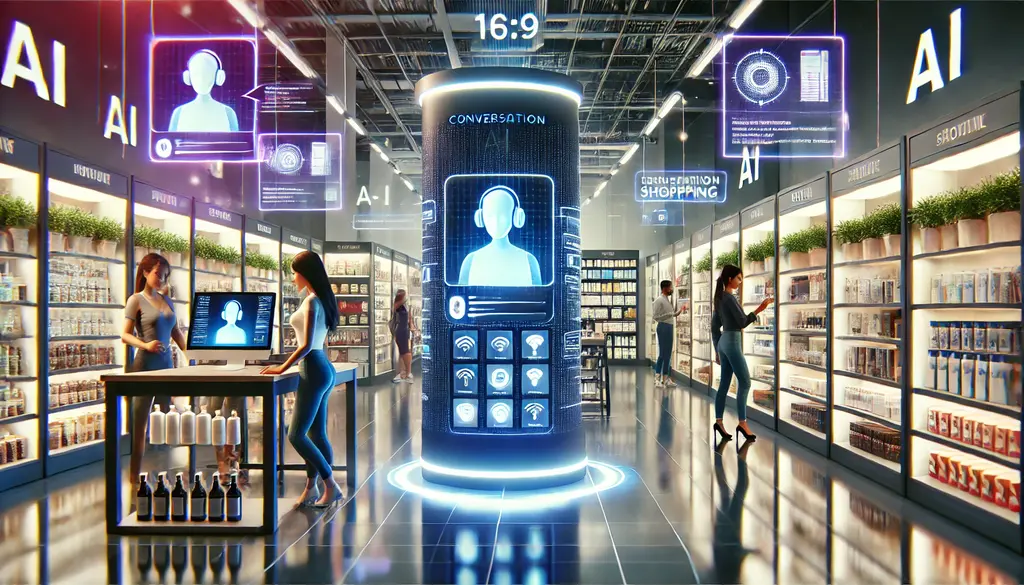7 Use Cases of Conversational AI in Retail
Conversational AI is reshaping the retail industry in unprecedented ways. By integrating technologies such as chatbots, voice assistants, and natural language processing, retailers are creating more personalized, efficient, and engaging... The post 7 Use Cases of Conversational AI in Retail appeared first on Bigly Sales.

Conversational AI is reshaping the retail industry in unprecedented ways. By integrating technologies such as chatbots, voice assistants, and natural language processing, retailers are creating more personalized, efficient, and engaging experiences for their customers.
The retail industry has evolved, and conversational AI sits at the heart of this transformation.
This article looks into some of the top and impactful use cases of conversational AI in retail, showcasing how it revolutionizes customer interactions and business operations.
Use Cases of Conversational AI in Retail
Here are some of the best use cases of conversational AI in retail:
1. Personalized Shopping Assistance
Think about the difference a knowledgeable sales associate makes in a physical store—someone who knows your preferences, suggests items you’ll love, and even remembers your past purchases.
Conversational AI brings this level of personalization to digital and physical retail experiences. By analyzing browsing history, purchase patterns, and customer preferences, AI-powered chatbots and virtual assistants provide tailored recommendations.
For instance, when a customer visits an online fashion store, an AI assistant might ask, “Are you shopping for an occasion or everyday wear?” Based on the response, it can present a curated list of items, saving the customer time and effort.
\Conversational AI also enhances cross-selling opportunities by suggesting complementary products. For example, a chatbot could recommend a matching jacket for a newly selected dress or suggest skincare products based on a customer’s purchase of a makeup kit. This improves the shopping experience, boosts sales, and fosters loyalty.
2. 24/7 Customer Support
Modern customers value convenience and expect instant support at any hour. Conversational AI addresses this demand by providing 24/7 customer assistance.
Unlike human agents, AI-driven systems can handle thousands of queries simultaneously without compromising speed or accuracy. They can answer questions about product availability, shipping policies, returns, and more—all in real time.
Imagine a shopper browsing an e-commerce site late at night and wanting to confirm whether an item is eligible for next-day delivery. An AI chatbot can provide this information instantly, ensuring the customer can complete their purchase without delay.
Furthermore, conversational AI’s ability to handle basic queries allows human customer service agents to focus on resolving more complex issues, optimizing overall efficiency. Retailers that implement this technology are better equipped to meet the expectations of today’s demanding consumers.
3. Efficient Order Tracking and Management
The post-purchase phase is just as crucial as the buying process itself, and keeping customers informed about their orders is vital for maintaining trust. Conversational AI simplifies order tracking by providing real-time updates through chatbots or voice assistants.
Customers can ask, “Where is my order?” and receive detailed information about its current location, estimated delivery time, and any potential delays.
This functionality minimizes the need for customers to contact support teams manually and eliminates frustration caused by uncertainty. Additionally, conversational AI systems can send proactive notifications, such as confirming that an order has shipped or alerting the customer about delivery updates.
Retailers benefit from reduced operational costs as fewer inquiries reach their support teams, and customers enjoy a seamless experience from purchase to delivery.
4. Streamlined Inventory Management
Effective inventory management is crucial for any retailer. Overstocking leads to unnecessary costs, while stockouts can result in lost sales and dissatisfied customers. Conversational AI enhances inventory management by analyzing data from multiple sources, including sales trends, seasonal patterns, and customer behavior.
For example, an AI system might predict increased demand for a specific product during the holiday season and recommend restocking accordingly. It can also alert sales teams if certain items are running low, ensuring shelves and online stores remain stocked.
Moreover, conversational AI allows customers to inquire about product availability in real time, providing accurate information on whether an item is in stock and where it can be found. This level of transparency and efficiency benefits customers and retailers, improving satisfaction and reducing operational headaches.
5. Dynamic Customer Segmentation
One-size-fits-all marketing is no longer effective in today’s competitive retail environment. Conversational AI enables dynamic customer segmentation by analyzing a wealth of data, including purchase history, browsing behavior, and engagement patterns. Retailers can use these insights to create highly targeted campaigns and personalized offers.
For instance, AI can identify a segment of customers who frequently purchase outdoor gear and send them promotions for the latest camping equipment or hiking shoes. It can also identify high-spending customers and provide them with exclusive rewards to encourage continued loyalty.
This precision ensures that marketing efforts resonate with customers, driving higher engagement and conversion rates. By leveraging conversational AI, retailers can build deeper connections with their audiences and increase the effectiveness of their outreach efforts.
6. Automated Customer Feedback Analysis
Customer feedback is invaluable for understanding what works and what doesn’t, but manually analyzing feedback can be a daunting task. Conversational AI automates this process, collecting input from surveys, reviews, and social media, and analyzing it for actionable insights. These systems can identify recurring themes, detect sentiment, and highlight areas for improvement.
For example, if several customers mention dissatisfaction with packaging quality, conversational AI can flag this as an issue for the retailer to address. Similarly, it can highlight positive feedback about popular products, enabling businesses to focus their efforts on expanding successful product lines.
By leveraging AI for feedback analysis, retailers gain a clearer understanding of customer expectations and can make data-driven decisions to enhance their offerings and operations.
7. Reducing Cart Abandonment
Cart abandonment is a persistent challenge for online retailers, often leading to significant revenue losses. Conversational AI tackles this issue by engaging customers at critical moments. When a shopper leaves items in their cart, AI chatbots can send personalized reminders, offer incentives, or address potential concerns.
For instance, a chatbot might reach out with a message like, “We noticed you left a pair of sneakers in your cart. Complete your purchase within the next hour and enjoy 10% off!” By providing timely nudges and addressing common barriers, such as questions about shipping costs or return policies, conversational AI encourages customers to complete their purchases.
Retailers who implement this strategy often see noticeable reductions in cart abandonment rates and higher conversion rates.
Conclusion
Conversational AI is more than just a technological trend—it’s a fundamental shift in how retailers operate and interact with their customers. From personalized shopping assistance to reducing cart abandonment, these seven use cases demonstrate the transformative potential of AI in retail. By adopting conversational AI, retailers can deliver exceptional customer experiences, streamline operations, and drive revenue growth.
As the retail landscape continues to evolve, businesses that embrace conversational AI will be better positioned to meet the demands of modern consumers. Whether it’s through real-time support, dynamic segmentation, or automated feedback analysis, conversational AI offers innovative solutions that benefit customers and retailers.
In a world where customer expectations are higher than ever, leveraging conversational AI isn’t just an advantage—it’s a necessity for staying ahead in the competitive retail market.
The post 7 Use Cases of Conversational AI in Retail appeared first on Bigly Sales.














































































